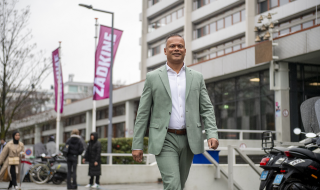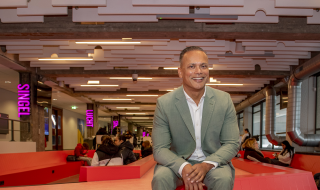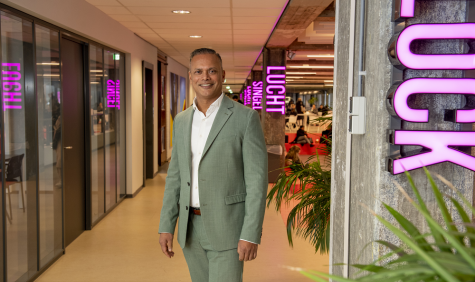"Many of our students underestimate themselves."
"Our biggest challenge is making sure everyone can participate"
"Our biggest challenge is making sure everyone can participate"
Aniel Ramawadh was the first in his family to go to university, thanks to an elementary school teacher who encouraged him to pursue vwo. Now he is a member of the executive board of Zadkine in Rotterdam. "I hope that with the help of digitization we can make education accessible to everyone," he says.
It smells like pepernoten in the hall of Zadkine in the centre of Rotterdam. Bread & Pastry students walk down the corridor in white aprons. In a small room, aspiring stewardesses listen to their teacher. This mbo institution offers a wide range of courses to 17,000 students. They are trained as hairdressers, forklift drivers, nurses or silversmiths, for example.
It is a typical Rotterdam school, says Aniel Ramawadh. "We are dealing with metropolitan issues here. More than 60 per cent of the students have a migrant background. In all of Rotterdam, that ratio is 50-50. So diversity is a reality. Our biggest challenge is inclusiveness: making sure everyone can participate."
"I never had role models myself"
Two years ago, Ramawadh joined the Zadkine board. "Aniel is a role model for the youth of Rotterdam," said the news release about his appointment. He was born in Suriname and grew up in Rotterdam-West. "That was not a nice place at the time, with high unemployment and low literacy. You don't expect someone from a family with people who have always worked in cleaning and factories, to become a director of a large institution. But you see: it is possible. I am proud that I now run the school that my siblings attended."
His parents only attended primary school, and at home, Ramawadh was not really encouraged to learn. "After primary school, I wanted to go to mavo because that's where all my friends went. But one of my teachers said: you can do more. It had never occurred to me to go to vwo. He signed me up personally. I never had any role models myself, not even in my subsequent career. You really have to be open to learning."

Aniel Ramawadh walks outside Zadkine
The building was closed, but education had to continue
He chose to study development economics because he cared about the fate of others. "I was concerned about poverty. I worked at the Ministry of Finance, a housing association, the mental health services, until I reached a point where I thought: what do I want to do with my career now? A headhunter asked me if I was interested in teaching. And actually I always wanted to. I enjoy sharing knowledge and developing myself."
Ramawadh joined Zadkine in corona time. The building was closed, but teaching had to continue. "We provided a lot of online classes, used tools and set up classrooms for blended learning, a combination of face-to-face and digital teaching. Our team did that very cleverly. But that is not the same as digital transformation. Meanwhile, I also worked on a digital strategy."
The digital campus is all about the student
That strategy, according to Ramawadh, starts with a good IT infrastructure: "Your network, wifi, laptops: all those resources have to work well and be connected. Then you start harmonising and standardising all the processes in your organisation. You can then start working data-driven, because you shouldn't make decisions based on gut feeling. For example, you want to identify student dropouts in time, so that everyone leaves the institution with a diploma."
The last pillar in his digital vision, Ramawadh calls the 'digital campus', where students are the first focus. "Just like in the physical world you have a school building with classrooms and practice rooms, I want to create the same in the digital world. An environment where students can follow different modules and teachers can share knowledge and find tools. We are developing that now."

Making education accessible to all
Ramawadh was involved in the funding application for the Digital Transformation Impulse for Education, a program to improve education by taking advantage of the opportunities of digitalization. "I'm a tremendous supporter of that because it's all about the student. Some are late bloomers. They start working first and then pick up their studies again. We are really moving toward lifelong learning. For that, we have to agree on one basic structure in the Netherlands. So that a student doesn't have to re-apply and submit supporting documents every time. I think it would be great if we could achieve that together."
"I believe in a different way of education. Selecting based on the Cito test is so early, it does damage. We have many students whom we need to help with their self-esteem: they feel 'not good enough for vwo.' Whereas all types of education are equal, and that is how it should be perceived. We have a student from a university of applied sciences who takes courses here. He designs something there and builds a prototype here. Currently, a lot has to be arranged for that."
"The idealist in me hopes that with the Digital Transformation Impulse we will make education accessible to everyone. See, there are various kinds of poverty. If you couldn't go on a school trip in the past, that was unpleasant. Now, if students don't have a mobile phone or a laptop, they are really excluded from society. You think all young people can handle computers, but many of our students have never had a laptop at home and have no digital skills. So we need to train in that as well. We now have digital citizenship classes and I'm really proud of that."
Text: Josje Spinhoven
Photo's: Sicco van Grieken
